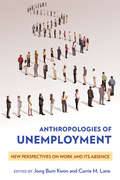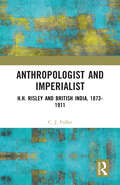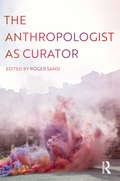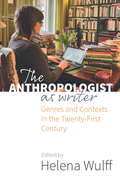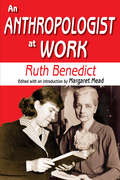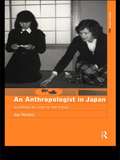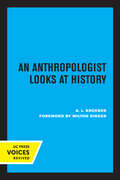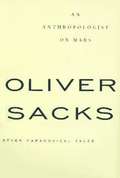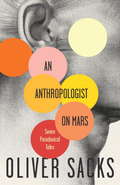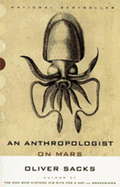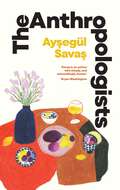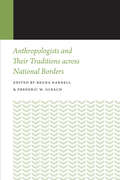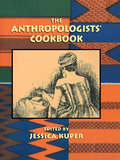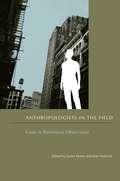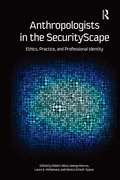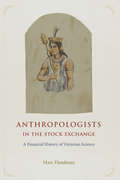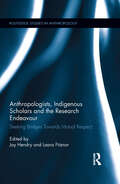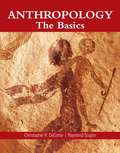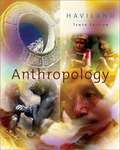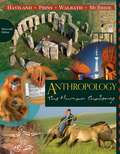- Table View
- List View
Anthropologies of Unemployment: New Perspectives on Work and Its Absence
by Jong Bum Kwon Carrie M. LaneAnthropologies of Unemployment offers accessible, theoretically innovative, and ethnographically rich examinations of unemployment in rural and urban regions across North and South America, Europe, Africa, and Asia. The diversity of case studies demonstrates that unemployment is a pressing global phenomenon that sheds light on the uneven consequences of free-market ideologies and policies. Economic, social, and cultural marginalization is common in the lives of the unemployed, but their experience and interpretation are shaped by local and national cultural particularities. In exploring those differences, the contributors to this volume employ recent theoretical innovations and engage with some of the more salient topics in contemporary anthropology, such as globalization, migration, youth cultures, bureaucracy, class, gender, and race.Taken together, the chapters reveal that there is something new about unemployment today. It is not a temporary occurrence, but a chronic condition. In adjusting to persistent, longstanding unemployment, people and groups create new understandings of unemployment as well as of work and employment; they improvise new forms of sociality, morality, and personhood. Ethnographic studies such as those found in Anthropologies of Unemployment are crucial if we are to understand the broader forms, meanings, and significance of pervasive economic insecurity and discover the emergence of new social and cultural possibilities.Contributors Josh Fisher, High Point UniversityDavid Karjanen, University of MinnesotaAnn E. Kingsolver, University of KentuckyJong Bum Kwon, Webster UniversityCarrie M. Lane, California State University, FullertonCaitrin Lynch, Olin College Daniel Mains, University of Oklahoma John P. Murphy, Gettysburg CollegeMariano D. Perelman, University of Buenos AiresFrances Abrahamer Rothstein, Montclair State UniversityClaudia Strauss, Pitzer College
Anthropologist: Scientist of the People
by Mary BattenProvides an in-depth look at the life of an anthropologist as one explains her field and data gathering processes in relation to her fifteen-year study of the Ache, a tribe of hunter-gatherers living in Paraguay.
Anthropologist and Imperialist: H.H. Risley and British India, 1873-1911
by C. J. FullerSir Herbert Hope Risley (1851 - 1911) - 'H. H. Risley', as he always signed himself - was a member of the Indian Civil Service (ICS) from 1873 to 1910 who served in Bengal and became a senior administrator and policymaker in the colonial government, as well as the pre-eminent anthropologist in British India. He was also an imperialist, who was convinced of the rightness of 'civilising' British rule and its benefits for both India and Britain, and one of this book's objectives is to render his simultaneous commitment to anthropology and imperialism intelligible to present-day readers. More specifically, Anthropologist and Imperialist: H. H. Risley and British India, 1873–1911 documents the two sides of Risley’s career, which is used as a case-study to investigate, first, the production and circulation of colonial knowledge, specifically anthropological knowledge, and secondly, its often loose and inconsistent connection with administration and policymaking, and with the government and state overall. Risley, like other officials engaged in anthropology in India, as well as the government itself, insisted that ethnography and anthropology had both ‘administrative’ and ‘scientific’ value; unlike previous works on Indian colonial anthropology, this book carefully examines its ‘scientific’ contributions in relation to contemporary metropolitan anthropology. It does not attempt to reinvent ‘greatman’ political or intellectual history, but does demonstrate the importance of studying the powerful officials who ruled British India, as well as the minor provincial politicians and subaltern subjects – or the abstract forces, such as colonialism and resistance – that have dominated recent historical scholarship. This book shows, too, that a detailed inquiry into Risley’s career, and his ideas and actions, can open new perspectives on a variety of continuing debates, including those over the colonial construction of caste and race in ‘traditional’ India, orientalism and forms of colonial knowledge, Victorian anthropology’s close relationship with the British empire, and the modern discipline’s uneasy links with its colonial past. Print edition not for sale in South Asia (India, Sri Lanka, Nepal, Bangladesh, Pakistan and Bhutan)
The Anthropologist as Curator (Criminal Practice Ser.)
by Roger SansiWhy do contemporary art curators define their work as ethnography? How can curation illuminate the practice of contemporary anthropology? Does anthropology risk disappearing as a specific discipline within the general model of the curatorial? The Anthropologist as Curator collects together the research of international scholars working at the intersection of anthropology and contemporary art in order to explore these questions. The essays in the book challenge what it means to do ethnographic work, as well as the very definition of the discipline of anthropology in confrontation with the model of the curatorial. The contributors examine these ideas from a variety of angles, and the book includes perspectives from anthropologists who have set up their own exhibitions; those who have conducted fieldwork on the arts, including participatory practices, digital images and sound; and contributors who are currently working in a curatorial capacity at a museum.With case studies from the USA, Canada, Germany, Brazil, Mexico, India and Japan, the book represents an international perspective and is relevant to students and scholars of anthropology, contemporary art, museum studies, curatorial studies and heritage studies.
The Anthropologist as Writer: Genres and Contexts in the Twenty-First Century
by Helena WulffWriting is crucial to anthropology, but which genres are anthropologists expected to master in the 21st century? This book explores how anthropological writing shapes the intellectual content of the discipline and academic careers. First, chapters identify the different writing genres and contexts anthropologists actually engage with. Second, this book argues for the usefulness and necessity of taking seriously the idea of writing as a craft and of writing across and within genres in new ways. Although academic writing is an anthropologist's primary genre, they also write in many others, from drafting administrative texts and filing reports to composing ethnographically inspired journalism and fiction.
An Anthropologist at Work
by Ruth BenedictAn Anthropologist at Work is the product of a long collaboration between Ruth Benedict and Margaret Mead. Mead, who was Benedict's student, colleague, and eventually her biographer, here has collected the bulk of Ruth Benedict's writings. This includes letters between these two seminal anthropologists, correspondence with Franz Boas (Benedict's teacher), Edward Sapir's poems, and notes from studies that Benedict had collected throughout her life. Since Benedict wrote little, Mead has fleshed out the narratives by adding background information on Benedict's life, work, and the cultural atmosphere of the time.Ruth Benedict formed her own view of the contribution of anthropology before the first steps were taken in the study of how individual human beings, with their given potentialities, came to embody their culture. In her later work, she came to accept and sometimes to use the work in culture and personality that depended as much upon social psychology as upon cultural anthropology. She came to recognize that society - made up of persons or organized in groups - was as important as a subject of study as the culture of a society.This volume, greatly enhanced by Mead's contributions, is a record of what was important to Benedict in her life and work. It is expertly ordered and assembled in a way that will be accessible to students and professionals alike.
An Anthropologist in Japan: Glimpses of Life in the Field (The ASA Research Methods)
by Joy HendryIn this highly personal account Joy Hendry relates her experiences of fieldwork in a Japanese town and reveals a fascinating cross-section of Japanese life. She sets out on a study of politeness but a variety of unpredictable events including a volcanic eruption, a suicide and her son's involvement with the family of a poweful local gangster, begin to alter the direction of her research. The book demonstrates the role of chance in the acquisition of anthropological knowledge and demonstrates how moments of insight can be embedded in everyday activity. An Anthropologist in Japan illuminates the education system, religious beliefs, politics, the family and the neighbourhood in modern Japan.
An Anthropologist Looks at History
by A. L. KroeberThis title is part of UC Press's Voices Revived program, which commemorates University of California Press’s mission to seek out and cultivate the brightest minds and give them voice, reach, and impact. Drawing on a backlist dating to 1893, Voices Revived makes high-quality, peer-reviewed scholarship accessible once again using print-on-demand technology. This title was originally published in 1963.
An Anthropologist on Mars: Seven Paradoxical Tales
by Oliver SacksHere are seven detailed and fascinating portraits of neurological patients, including a surgeon consumed by the compulsive tics of Tourette's syndrome unless he is operating; an artist who loses all sense of color in a car accident, but finds a new sensibility and creative power in black and white; and an autistic professor who cannot decipher the simplest social exchange between humans, but has built a career out of her intuitive understanding of animal behavior.
An Anthropologist on Mars
by Oliver SacksTo these seven narratives of neurological disorder Dr. Sacks brings the same humanity, poetic observation, and infectious sense of wonder that are apparent in his bestsellers Awakenings and The Man Who Mistook His Wife for a Hat. These men, women, and one extraordinary child emerge as brilliantly adaptive personalities, whose conditions have not so much debilitated them as ushered them into another reality.
An Anthropologist on Mars: Seven Paradoxical Tales
by Oliver SacksTo these seven narratives of neurological disorder Dr. Sacks brings the same humanity, poetic observation, and infectious sense of wonder that are apparent in his bestsellers Awakenings and The Man Who Mistook His Wife for a Hat. These men, women, and one extraordinary child emerge as brilliantly adaptive personalities, whose conditions have not so much debilitated them as ushered them into another reality.
An Anthropologist on Mars
by Oliver SacksTo these seven narratives of neurological disorder Dr. Sacks brings the same humanity, poetic observation, and infectious sense of wonder that are apparent in his bestsellers Awakenings and The Man Who Mistook His Wife for a Hat. These men, women, and one extraordinary child emerge as brilliantly adaptive personalities, whose conditions have not so much debilitated them as ushered them into another reality.
The Anthropologists
by Aysegül Savas&‘Savaş&’ prose is an X-ray – an acute portrait of the tender frequencies that make a life.&’ Raven Leilani, author of Luster Asya and Manu are looking at apartments, envisioning their future in a foreign city. Removed from the web of family and its obligations, what traditions and rituals should they establish together? As they dream about the possibilities of each new listing, Asya, a documentary filmmaker, spends her days gathering footage from the neighbourhood park like an anthropologist observing local customs, anxious to know how people really live. &‘Forget about daily life,&’ chides her grandmother on the phone, &‘no one cares about that.&’ Meanwhile, life back in Asya and Manu's respective home countries continues – parents age, grandparents get sick, nieces and nephews grow up – all just slightly beyond their reach. But the world they're making in their new city is growing, too, they hope. As they open up the horizons of their lives, what and whom will they hold onto, and what will they need to release?Unfolding over a series of apartment viewings, late-night conversations, last rounds of drinks and lazy breakfasts, The Anthropologists is a soulful examination of home-building and modern love, written with Aysegül Savaş&’ distinctive elegance, warmth and humour. Advance praise for THE ANTHROPOLOGISTS &‘The Anthropologists is about love, youth, and that most profound and elusive of subjects – happiness. Full of delicacy, wisdom and wit, this is another gorgeous work from one of my favourite writers.&’ Katie Kitamura, author of Intimacies &‘Like Walter Benjamin, Ayşegül Savaş uncovers trapdoors to bewilderment everywhere in everyday life; like Henry James, she sees marriage as a mystery, unsoundably deep. The Anthropologists is mesmerising; I felt I read it in a single breath.&’ Garth Greenwell, author of Cleanness &‘Yet another gorgeous, gorgeous book from Aysegül Savaş: she is an author who simply, and astoundingly, knows. Savaş knows hope. Savaş knows despair. Savaş knows joy, and malaise, and laughter and curiosity. There are worlds inside of Savaş' prose, and The Anthropologists is both a bright light and a map for how to be. A massively heartening achievement.&’ Bryan Washington, author of Family Meal
Anthropologists and the Rediscovery of America, 1886-1965
by John S. GilkesonThis book examines the intersection of cultural anthropology and American cultural nationalism from 1886, when Franz Boas left Germany for the United States, until 1965, when the National Endowment for the Humanities was established. Five chapters trace the development within academic anthropology of the concepts of culture, social class, national character, value, and civilization, and their dissemination to non-anthropologists. As Americans came to think of culture anthropologically, as a "complex whole" far broader and more inclusive than Matthew Arnold's "the best which has been thought and said," so, too, did they come to see American communities as stratified into social classes distinguished by their subcultures; to attribute the making of the American character to socialization rather than birth; to locate the distinctiveness of American culture in its unconscious canons of choice; and to view American culture and civilization in a global perspective.
Anthropologists and Their Traditions across National Borders (Histories of Anthropology Annual)
by Regna Darnell Frederic W. GleachVolume 8 of the Histories of Anthropology Annual series, the premier series published in the history of the discipline, explores national anthropological traditions in Britain, the United States, and Europe and follows them into postnational contexts. Contributors reassess the major theorists in twentieth-century anthropology, including the work of luminaries such as Franz Boas, Claude Lévi-Strauss, Bronisław Malinowski, A. R. Radcliffe-Brown, and Marshall Sahlins, as well as lesser-known but important anthropological work by Berthold Laufer, A. M. Hocart, Kenelm O. L. Burridge, and Robin Ridington, among others.These essays examine myriad themes such as the pedagogical context of the anthropologist as a teller of stories about indigenous storytellers; the colonial context of British anthropological theory and its projects outside the nation-state; the legacies of Claude Lévi-Strauss’s structuralism regarding culture- specific patterns; cognitive universals reflected in empirical examples of kinship, myth, language, classificatory systems, and supposed universal mental structures; and the career of Marshall Sahlins and his trajectory from neo-evolutionism and structuralism toward an epistemological skepticism of cross- cultural miscommunication.
Anthropologist'S Cookbook
by KuperFirst published in 1997. Routledge is an imprint of Taylor & Francis, an informa company.
Anthropologists in the Field: Cases in Participant Observation
by Hume Lynne Jane Mulcock Eds.All too often anthropologists and other social scientists go into the field with unrealistic expectations. Different cultural milieus are prime ground for misunderstandings, misinterpretations, and interrelational problems. This book is an excellent introduction to real-world ethnography, using familiar and not-so-familiar cultures as cases. <P><P>The book covers participant observation and ethnographic interviewing, both short and long term. These methodologies are open to problems such as lack of communication, depression, hostility, danger, and moral and ethical dilemmas—problems that are usually sanitized for publication and ignored in the curriculum. Among the intriguing topics covered are sexualized and violent environments, secrecy and disclosure, multiple roles and allegiances, insider/outsider issues, and negotiating friendship and objectivity.
Anthropologists in the SecurityScape: Ethics, Practice, and Professional Identity
by Robert Albro George E. Marcus Laura A. McNamara Monica Schoch-SpanaAs the military and intelligence communities re-tool for the 21st century, the long and contentious debate about the role of social scientists in national security environments is dividing the disciplines with renewed passion. Yet, research shows that most scholars have a weak understanding of what today's security institutions actually are and what working in them entails. This book provides an essential new foundation for the debate, with fine-grained accounts of the complex and varied work of cultural, physical, and linguistic anthropologists and archaeologists doing security-related work in governmental and military organizations, the private sector, and NGOs. In candid and provocative dialogues, leading anthropologists interrogate the dilemmas of ethics in practice and professional identity. Anthropologists in the SecurityScape is essential reading for anyone who wishes to understand or influence the relationship between anthropology and security in the twenty-first century.
Anthropologists in the Stock Exchange: A Financial History of Victorian Science
by Marc FlandreauUncovering strange plots by early British anthropologists to use scientific status to manipulate the stock market, Anthropologists in the Stock Exchange tells a provocative story that marries the birth of the social sciences with the exploits of global finance. Marc Flandreau tracks a group of Victorian gentleman-swindlers as they shuffled between the corridors of the London Stock Exchange and the meeting rooms of learned society, showing that anthropological studies were integral to investment and speculation in foreign government debt, and, inversely, that finance played a crucial role in shaping the contours of human knowledge. Flandreau argues that finance and science were at the heart of a new brand of imperialism born during Benjamin Disraeli’s first term as Britain’s prime minister in the 1860s. As anthropologists advocated the study of Miskito Indians or stated their views on a Jamaican rebellion, they were in fact catering to the impulses of the stock exchange—for their own benefit. In this way the very development of the field of anthropology was deeply tied to issues relevant to the financial market—from trust to corruption. Moreover, this book shows how the interplay between anthropology and finance formed the foundational structures of late nineteenth-century British imperialism and helped produce essential technologies of globalization as we know it today.
Anthropologists, Indigenous Scholars and the Research Endeavour: Seeking Bridges Towards Mutual Respect (Routledge Studies in Anthropology)
by Joy Hendry Laara FitznorThis collection offers the fruits of a stimulating workshop that sought to bridge the fraught relationship which sometimes continues between anthropologists and indigenous/native/aboriginal scholars, despite areas of overlapping interest. Participants from around the world share their views and opinions on subjects ranging from ideas for reconciliation, the question of what might constitute a universal "science," indigenous heritage, postcolonial museology, the boundaries of the term "indigeneity," different senses as ways of knowing, and the very issue of writing as a method of dissemination that divides and excludes readers from different backgrounds. This book represents a landmark step in the process of replacing bridges with more equal patterns of intercultural cooperation and communication.
Anthropology
by Stanley BarrettStanley R. Barrett's Anthropology has long been a premiere sourcebook for students, providing a comprehensive overview of both theory and method in the discipline. In this updated second edition, Barrett's discussion of the origins and evolution of anthropology remains, augmented by sections addressing recent changes and ongoing questions in the field.The second edition of Anthropology adds important new material on questions of culture versus power, Max Weber's thought, the potential of applied anthropology, and the rise of public anthropology, while briefly touching on the anthropology of globalization. As in the previous edition, Barrett remains committed to exploring the impact of postmodernism on the practice and theory of anthropology, positing that it is a formless and ultimately short-lived approach. Including case studies to demonstrate real-world applications of the theories discussed, Barrett's Anthropology remains an essential text for students and teachers of anthropology.
Anthropology: The Basics
by Christopher R. DeCorse Raymond ScupinExplore the similarities and differences that characterize humanity Anthropology: The Basics provides a concise introduction to the subfields of anthropology, designed for instructors who want an overview of key concepts, to which they can add supplementary case studies and readings. Incorporating both classic and current research, authors Christopher DeCorse and Raymond Scupin lead students to examine the similarities across cultures, as well as the differences among different peoples. Exploring interactions between anthropology and other fields, Anthropology: The Basics awakens students to anthropology’s unique, holistic perspective—sparking the critical imagination that brings learning to life.
Anthropology
by William A. HavilandThe purpose is to transmit and register ideas and information, to induce the readers to see old things in new ways, and then to ask readers to think about what they see.
Anthropology: The Human Challenge
by William A. Haviland Harald E. L. Prins Bunny Mcbride Dana WalrathThis book offers a comprehensive and balanced presentation on views of human culture, evolution, and prehistory. The text presents the principles and processes of anthropology, both physical (biological) and cultural, including ethnology, linguistics, and prehistoric archaeology in an integrated, holistic manner. The book's framework emphasizing the challenge of human survival, the connections between biology and culture, and the impact of globalization on peoples and cultures around the world, serves to unify the material. The authors integrate contemporary research and ideas from several schools of thought, and use a lively writing style to engage readers and keep them interested in "real world" anthropology.
